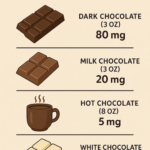How to Tell If Your Daughter Will Become a Moral Woman
In today’s society, girls are gaining more responsibility and pressure. As a girl, she must not bully others or let others bully her. She also must be independent. As parents, it’s important to find out if your daughter is acting morally at school and outside of your home. Here are …
Infancy
“Zero Sugar” Foods May Not Be Safer for Children—What Parents Need to Know
When shopping at the supermarket, many parents notice snacks labeled “zero sugar” or “no added sugar.” These products often look healthier than regular sugary foods, and some parents even choose them specifically for their babies. However, what many people don’t realize is that behind these labels often hides another potential …
Why Does My Baby Often Choke and Cough When Drinking Water, But Not Milk, Yogurt, or Rice Porridge?
If your baby frequently chokes or coughs when drinking plain water but not when consuming milk, yogurt, or rice porridge, it may be due to several factors. In some cases, if a baby chokes on plain water but drinks fruit-infused water without issue, this could suggest a dislike or aversion …
How to Balance Complementary Foods and Milk After Introducing Solids to Your Baby
Around six months of age, when babies begin to eat complementary foods, many parents find themselves confused about how to balance these new foods with milk. The key is to understand that complementary foods are meant to “supplement the milk, enhance overall nutrition, and support the development of the baby’s …
Toddler
“Zero Sugar” Foods May Not Be Safer for Children—What Parents Need to Know
When shopping at the supermarket, many parents notice snacks labeled “zero sugar” or “no added sugar.” These products often look healthier than regular sugary foods, and some parents even choose them specifically for their babies. However, what many people don’t realize is that behind these labels often hides another potential …
Can Chocolate Cause Precocious Puberty in Babies? The Truth Is…
When people are in a bad mood, many instinctively reach for a piece of chocolate to lift their spirits. Whether this effect is due to chemistry or psychology is hard to say, but one thing is certain: chocolate often makes us feel better. As a result, it becomes a regular …
Why Children Bite Their Nails: It’s Not a Vitamin Deficiency!
Dear parents, have you noticed that your child’s fingertips are always bare and their nails are bitten unevenly? Many parents immediately assume: “Is my child lacking vitamins?” “Should I buy supplements?” But here’s the truth: 90% of nail-biting is not caused by vitamin deficiency. 01. Unfinished “Oral Needs” Before age …
Preschooler
Can Chocolate Cause Precocious Puberty in Babies? The Truth Is…
When people are in a bad mood, many instinctively reach for a piece of chocolate to lift their spirits. Whether this effect is due to chemistry or psychology is hard to say, but one thing is certain: chocolate often makes us feel better. As a result, it becomes a regular …
Why Children Bite Their Nails: It’s Not a Vitamin Deficiency!
Dear parents, have you noticed that your child’s fingertips are always bare and their nails are bitten unevenly? Many parents immediately assume: “Is my child lacking vitamins?” “Should I buy supplements?” But here’s the truth: 90% of nail-biting is not caused by vitamin deficiency. 01. Unfinished “Oral Needs” Before age …
Did Your Baby Pass “Sheep Droppings”? Don’t Panic—Here’s What You Can Do
If your baby’s stool looks like tiny, hard balls—often referred to as “sheep dung” or “pellet-like stools”—you’re not alone. Many parents encounter this issue, and while it can be concerning, it’s usually manageable with the right approach. So, what causes this kind of constipation, and how can you help your …
Growth & Development
When Children Throw Tantrums: How to Calm Them in One Minute
At the toy section one weekend, 3-year-old Eric was carefully stacking blocks to build a castle. Just as he was about to finish, the triangular block on top slipped, and half the wall collapsed. In an instant, Eric grabbed a handful of blocks, threw them on the floor, and burst …
The Future of Children with ADHD: Beyond the Label
Children with ADHD are often unfairly labeled as “problem children”—easily distracted, hyperactive, impulsive, underperforming academically, or struggling socially. For many, this paints a bleak picture of their future. But is that truly the case? The truth is, while not every child may become a high achiever, more and more stories …
Why Encouragement Alone Isn’t Enough—Helping Children Overcome Fear of Difficulty
As children grow, so do their minds—full of richer, stronger ideas and firmer beliefs. You might start noticing: They clearly want to go skiing, but once they’re there, they want to back out. They can read English fluently, but if the sentence is too long, they shut down. They love …
Popular Articles
- How to Safely and Correctly Trim Your Baby’s Nails
- How to Balance Complementary Foods and Milk After Introducing Solids to Your Baby
- Developmental Milestone Promotion Training Methods (0-3 Months)
- A Mother’s Calm Response: How One Mom Handled Her Baby’s Headfirst Fall
- When Your Child Loses Their Temper: Four Key Tips to Help Them Learn Calmness and Benefit in the Long Run
- When Your Child Reaches the Terrible Twos, Don’t Reason with Them—Do This Instead!
- “Mom, I don’t want to go to kindergarten.” – Your answer is important!
- Kindergarten social secrets, we must teach children as early as possible
Health Info
- “Zero Sugar” Foods May Not Be Safer for Children—What Parents Need to Know
- Can Chocolate Cause Precocious Puberty in Babies? The Truth Is…
- Why Does My Baby Often Choke and Cough When Drinking Water, But Not Milk, Yogurt, or Rice Porridge?
- Can Babies Eat All Fruits? Myths, Risks, and Scientific Feeding Advice
- Did Your Baby Pass “Sheep Droppings”? Don’t Panic—Here’s What You Can Do
- How Much Salt Is Safe for Children? A Pediatrician Explains
- How to Balance Complementary Foods and Milk After Introducing Solids to Your Baby
- How to Make Children Fall in Love with Vegetables




